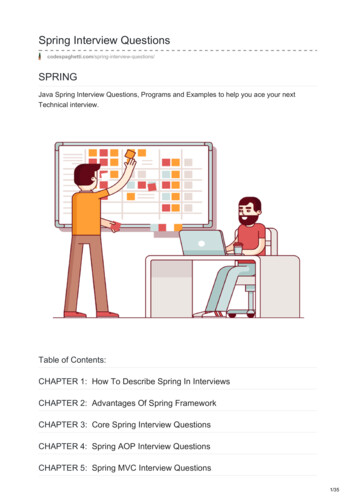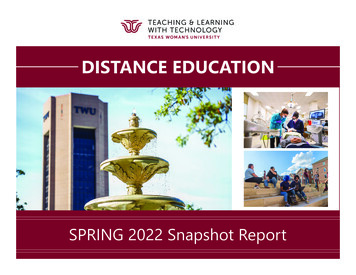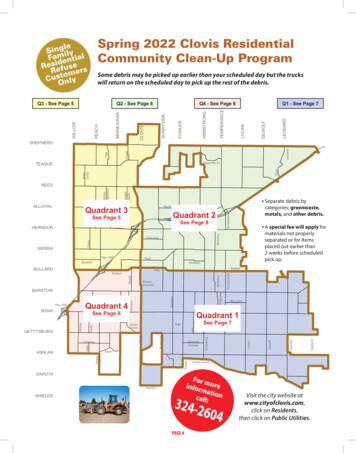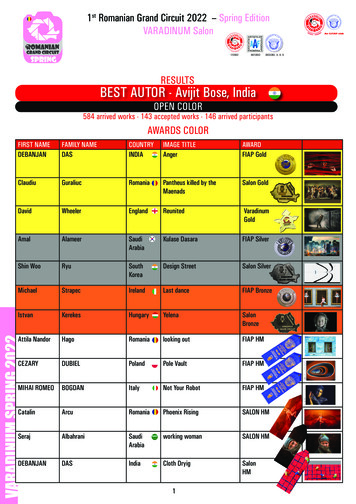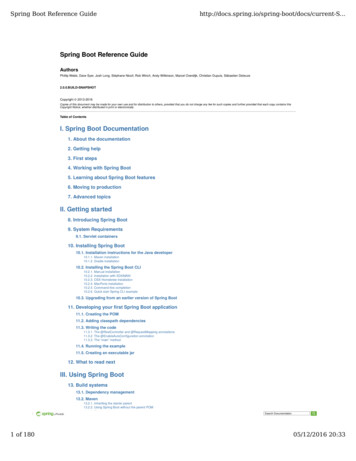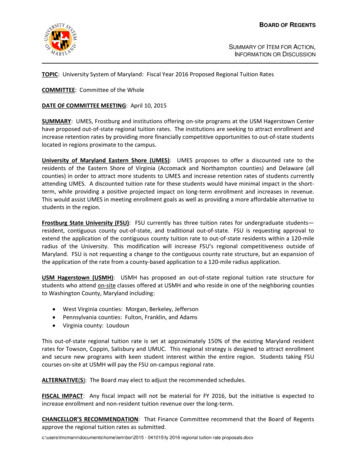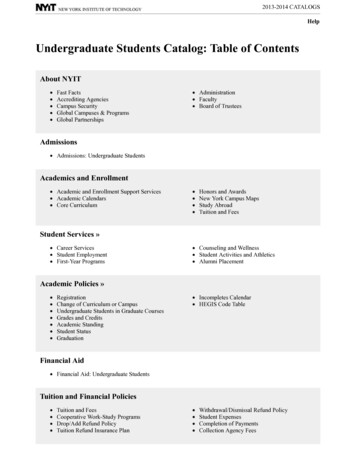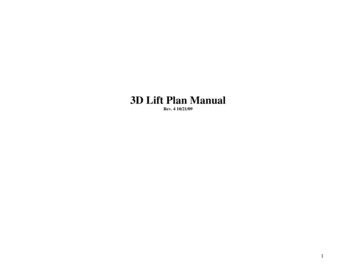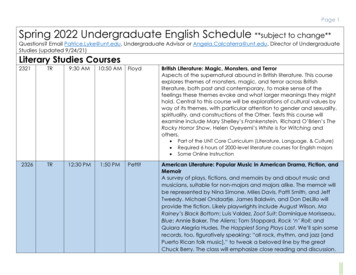
Transcription
Page 1Spring 2022 Undergraduate English Schedule **subject to change**Questions? Email Patrice.Lyke@unt.edu, Undergraduate Advisor or Angela.Calcaterra@unt.edu, Director of UndergraduateStudies (updated 9/24/21)Literary Studies Courses2321TR9:30 AM10:50 AMFloydBritish Literature: Magic, Monsters, and TerrorAspects of the supernatural abound in British literature. This courseexplores themes of monsters, magic, and terror across Britishliterature, both past and contemporary, to make sense of thefeelings these themes evoke and what larger meanings they mighthold. Central to this course will be explorations of cultural values byway of its themes, with particular attention to gender and sexuality,spirituality, and constructions of the Other. Texts this course willexamine include Mary Shelley’s Frankenstein, Richard O’Brien’s TheRocky Horror Show, Helen Oyeyemi’s White is for Witching andothers. 2326TR12:30 PM1:50 PMPettitPart of the UNT Core Curriculum (Literature, Language, & Culture)Required 6 hours of 2000-level literature courses for English majorsSome Online InstructionAmerican Literature: Popular Music in American Drama, Fiction, andMemoirA survey of plays, fictions, and memoirs by and about music andmusicians, suitable for non-majors and majors alike. The memoir willbe represented by Nina Simone, Miles Davis, Patti Smith, and JeffTweedy. Michael Ondaatje, James Baldwin, and Don DeLillo willprovide the fiction. Likely playwrights include August Wilson, MaRainey’s Black Bottom; Luis Valdez, Zoot Suit; Dominique Morisseau,Blue; Annie Baker, The Aliens; Tom Stoppard, Rock ‘n’ Roll; andQuiara Alegría Hudes, The Happiest Song Plays Last. We’ll spin somerecords, too, figuratively speaking: “all rock, rhythm, and jazz [andPuerto Rican folk music],” to tweak a beloved line by the greatChuck Berry. The class will emphasize close reading and discussion.
Page 2The professor welcomes all informed perspectives, whether or notthey accord with his own. Questions or comments? Contact Dr.Pettit at alex.pettit@unt.edu. 2326MW2:00 PM3:20 PM VillalobosAmerican Literature: Masters of American HorrorHorror is perhaps the most uniquely American genre of fiction. Fromthe earliest writings of the American colonists, fear and dismay creptinto the literature of the nation. In this course, we will examine someof the most foundational American horror authors, question the sortsof horror that have been canonically discussed and acknowledged,and reload the canon to include new works of horror from authorsthat challenge existing narratives and structures in horror andAmerican literature more generally. Students will be responsible forwriting three short papers and one longer paper with a researchcomponent, and will take a cumulative final exam covering theevolution of horror in American literature. Come join us if you dare. 2326TR11:00 AM12:20 AM ConnTRTR11:00 AM2:00 PM12:20 PM3:20 PMMitraMitraPart of the UNT Core Curriculum (Literature, Language, & Culture)Required 6 hours of 2000-level literature courses for English majorsAmerican Literature: Queer TextualitiesLong subject in the West to prohibitions on being named, LGBTQ practice has had a complicated relation to textuality. This class willexamine the specific complexities that attend the inscription ofsame sex desire in a selection of American literary texts. Topics willinclude: Queer theory, the deformations of homophobia and thecloset, indirect and direct self-disclosure, homoeroticism and queeraffirmation, the AIDS crisis, and the idea of chosen family. 23312331Part of the UNT Core Curriculum (Literature, Language, & Culture)Required 6 hours of 2000-level literature courses for English majorsPart of the UNT Core Curriculum (Literature, Language, & Culture)Required 6 hours of 2000-level literature courses for English majorsWorld Literature: Migration Stories Across the GlobeThough the US is often the destination of choice of many aspiringmigrants, the pattens of global migrations are more varied and
Page 3complex. People are moving not just to the US, but to other affluentnations in Europe, the Middle East, and Australia. Using The PenguinBook of Migration Literature (2019) to anchor the course, andsupplemented by some authors not represented in the anthology,the course will grapple with complex migrations and cross-culturalinteractions that are the hallmark of late 20th/early 21st centuryglobalization. We will read stories not just about migrants coming tothe US or the UK from countries as varied as Mexico, India, Nigeria, orHaiti, but we will also read stories about less familiar migrations -from Turkey to Germany, from Algeria to France, from India toAustralia, from the Philippines to Bahrain. As we read the stories, wewill attempt to learn about the histories of the countries the migrantsleave, as well as examine their successes and failures to leavebehind “home” and create a new one. Our discussions of thesestories will attend to traditional analytic frameworks such ascharacterization but will also pay close attention to histories andgeographies as they shape people’s lives. Some of the authors to bestudied might include Mena Abdullah, Chimamanda Adichie, MiaAlvar, Mehdi Charef, Edwidge Dandicat, Francisco Jimenez,Jhumpa Lahiri, Viet Thanh Nguyen, Emine Ozdamar, Salman Rushdie,and Zadie Smith 2331MWF11:00 AM11:50 AMRahmanPart of the UNT Core Curriculum (Literature, Language, & Culture)Required 6 hours of 2000-level literature courses for English majorsWorld Literature: The Empire Writes BackIn this course, we will study works of poetry, fiction, nonfiction, anddrama written about the colonial encounter, along with thosewritten as a response to it. The overarching goals of the coursewould be to explore themes that transcend national boundaries andopen new scales and modes of understanding. By reading anumber of literary works written from the Western- European traditionand others written against the same tradition, we will also examinehow concerns about identity, history, freedom, nationhood, andcultural heritage remain a major preoccupation in those works. The
Page 4texts produced by writers who belong to formerly colonized nationsand wrote in their respective historical and cultural contexts areexpected to question and re-examine the western literary canons. 2331TR3:30 PM4:50 PMRajaWorld Literature: Introduction to Postcolonial LiteratureThis course introduces you to some of the major world/postcolonialauthors. We will read these texts of the global periphery not simply ascrystallized versions of the cultures that they attempt to represent,but also use them as points of departure into a study of the largerpower structures within which these texts are produced. In doing sowe will also question our own place and privileged location withinthe academy and imagine the possibilities of making our workcommensurate with the acts of semiotic and material resistancebeing offered to the reigning power structures by the cultures of theglobal south in the spirit of what Gramsci describes as the organicintellectuals. 2331ONLINE COURSEConnPart of the UNT Core Curriculum (Literature, Language, & Culture)Required 6 hours of 2000-level literature courses for English majorsPart of the UNT Core Curriculum (Literature, Language, & Culture)Required 6 hours of 2000-level literature courses for English majorsSome Online InstructionWorld Literature: Unlikely Lit: Strange, Speculative, Magic, Marvelous,Meta, and FantasticThis course will survey a miscellany of literary works from across theglobe published between roughly the eighteenth and the twentyfirst centuries that play with or entirely eschew the conventions ofrealism. Each of our readings will in some way challenge the ideathat literature should strive for mimesis, the commonplace notionthat literature should accurately reflect or represent quotidianexistence. Thus our readings narrate unlikely events—at leastpurported ones—that depart from our probabilistic expectations forhow the world is supposed to work. Part of the UNT Core Curriculum (Literature, Language, & Culture)
Page 5 2341TR8:00 AM9:20 AMJoines,RickForms of Literature: An Entire World of Just 64 Squares: Chess inLiteratureIn this class, we will study beautiful narratives about chess. We willencounter heroes as they move across the board and on the page.We will meet teachers who provide tactics and strategies needed todefeat villains or battle inner demons. Chess is full of allegories andsymbols, comic and tragic tales, international intrigue, andromance. This “immortal game” crisscrosses with our thinking aboutpolitics, psychology, and gender. The study of literature and of chesscalls for close analysis and critical thinking. In this class, we willpractice both. 2341TR9:30 AM10:50 AMJoines,RainaRequired 6 hours of 2000-level literature courses for English majorsPart of the UNT Core Curriculum (Literature, Language, & Culture)Required 6 hours of 2000-level literature courses for English majorsSome Online InstructionForms of Literature: “New Maps of Hell”: Dystopia and Dark VisionsThe popularity of dystopian literature and film is on the rise; new workin the genre—The Hunger Games, Divergent, Blade Runner 2049—has circulated widely. But how can we contextualize such darkvisions of the future? These “new maps of hell” chart zones in thelandscape of utopian writing, the literature of “no place” that allowsus to explore the world we live in by imagining one that doesn’t yetexist. This course will introduce students to the formal features ofdystopian literature and offer a framework for discussing some of itscentral themes: accumulations of state power, coercive conformity,resource scarcity, our desire to tinker with technology and tamperwith nature, species competition, and our taste for destruction. We’llinvestigate the assigned texts to engage in a lively critique of thepresent and analyze representations of a world gone wrong. Part of the UNT Core Curriculum (Literature, Language, & Culture)Required 6 hours of 2000-level literature courses for English majors
Page 62341MWF9:00 AM9:50 AM MyersForms of Literature: Writing Women’s LivesThis is a course that creates vital space for exploring the work ofwomen’s writing, largely focusing on American Women Writers. Wewill look at multi-genre texts that examine the position of women inculture, directly confront social and political conditions, as well asexamine how gender and other individual social categories shapewomen’s lives. We will explore various theoretical lenses to think andwrite about these texts. 2341MW3:30 PM4:50 PM KhanForms of Literature: Utopian, Dystopian, and Apocalyptic Lit.Images of a destroyed, perfect, or dysfunctional world operateacross eras and cultures to criticize social and political conditions.Whether offering a vision of a more “perfect” world or onedestroyed by sociocultural plague, speculative literatures areimpacted by and shake the societies they reflect while also seekingto reveal the underlying psychological capacity and motivesunderpinning human activity. In this course, students will read andcritically discuss both modern and contemporary works,including Notes from Underground (Dostoevsky), The Trial (Kafka), Vfor Vendetta (Moore, Lloyd), Oryx and Crake (Atwood), TheRoad (McCarthy), and The Wandering Earth (Liu). Students will alsobe expected to write at least two critical essays in response to theseworks and the themes we explore together in class. 2351ONLINE COURSERodriguezPart of the UNT Core Curriculum (Literature, Language, & Culture)Required 6 hours of 2000-level literature courses for English majorsSome Online InstructionPart of the UNT Core Curriculum (Literature, Language, & Culture)Required 6 hours of 2000-level literature courses for English majorsMexican American LiteratureCourse covers key texts from the earlier periods of MexicanAmerican Literature, more recent issues dealing with contemporaryimmigration, and some newer works from emerging writersexpanding the field in exciting new directions.
Page 7 2800MWF11:00 AM11:50 AM Armintor,MIntroduction to Games and PlayThis course is a survey of the history, theory, and forms of play (howdoes play manifest itself in human culture and why?), and the waysthat play-energy can be channeled to organized play in the form ofgames. In addition to that, we will also investigate how narratives,both personal and social, can be built on top of both “unstructured”play and non-aleatory game design. Both the impulse to engage inplay and the drive to create games (both physical and digital) havemeanings beyond their respective arenas: social, political, andethical. These are issues that inform game design, game genres,game aesthetics, role-playing and identity within games, and ethicaldecision-making within games. In short, who are we when we playany game or sport, or just play for the sake of play? How does playreflect the way we see ourselves and others? 300030003000300030003000MWFTRTRTRTRTR11:00 AM2:00 PM12:30 PM11:00 PM9:30 PM3:30 PM11:50 AM3:20 PM1:50 PM12:20 PM10:50 PM6:20 PMDotyHoldemanChristianFoertschTR2:00 PM3:20 PM PettitRequired for the Game Studies CertificateIntroduction to Literary Analysis and Interpretation SkillsPrepares majors to understand literature and to articulate theirunderstanding in essays supported by carefully analyzed evidencefrom assigned works. Covers basic critical vocabulary, the majorliterary genres (poetry, drama, fiction) and the conventions thatgovern these genres. Students learn to evaluate multipleinterpretations of a text. 3360Part of the UNT Core Curriculum (Literature, Language, & Culture)Required 6 hours of 2000-level literature courses for English majorsRequired of all English MajorsSome Online Instruction in Christian’s sectionClassical Literature and Mythology: Comedies and Tragedies,Ancient and AdaptedFeaturing ancient Greek and Roman plays, comic and tragic, intranslation and as adapted in our own time. The myths and storiesimagined by the classical playwrights take on new relevance in thework of dramatists Black, white, Latinx, Asian American, Irish, French,
Page 8German, canonical, non-canonical, queer, straight, and very funnyand/or deadly serious. At issue are questions of heroism, race, storytelling, civic duty, humor, power, morality, sex, marriage, myth vs.history, protest, entertainment, and much more. The class willemphasize close reading and discussion. The professor welcomes allinformed perspectives, whether or not they accord with his own.Questions or comments? Contact Dr. Pettit at alex.pettit@unt.edu. 3430TR12:30 PM1:50 PM BrushBritish Literature to 1780A broad survey of British literature from the Anglo-Saxon period tothe late-18th century; includes the study of a variety of literarygenres and traditions. 3440TR2:00 PM3:20 PM Peters3450TRMWF2:00 PM10:00 AM3:20 PM10:50 AMONLINE COURSEAzizDimick(Coleman)ConnONLINE COURSEONLINE COURSESatisfies late survey for English majorsShort StoryComparative survey of the short story from its inception in the 19thcentury to the present day, comprising representative works byAfrican, Asian, British, Russian, North and South American, andEuropean writers, in English or in translation. 35003500Satisfies early survey for English majorsBritish Anglophone Literature from 1780 to the PresentA broad survey of British and Anglophone literature from theRomantic period to the present; includes the study of a variety ofliterary genres, movements and traditions. 34503450Satisfies early survey for English majorsCounts toward Classical Studies Minor and CertificateLanguage Arts Majors must take 3450 OR 3920Part of the UNT Core Curriculum (Literature, Language and Culture)Satisfies 20th and 21st century historical period for Lit-ConcentrationSome Online Instruction in Aziz’s sectionMagliocco Narrative and Story Development for Game WritingVideo games are the new frontier of imaginative literature. GameZimmererwriters rely upon traditional storytelling concepts, but also face
Page 9unique challenges and opportunities, such as the reconciliation ofgameplay and characterization. In recent years, titles such as TheLast of Us and What Remains of Edith Finch demonstrate the rapidadvancement in narrative sophistication for story-driven gaming. Thiscourse examines the key elements of narrative design and gamewriting, how to develop characters, and integrate gameplay andstory. Craft elements in traditional narrative will be scrutinized fortheir utility within the forms of video game genre and mechanics.The course is a workshop in which students will produce storyoverviews and scripting which function within a variety of gameplaystory structures. Exercises and assignments will prioritize game theory,methods of characterization and narrative theory, and how toincorporate these craft ideas into game mechanics. Students willproduce two Story Overviews following industry conventions and asingle, Executive “One-Sheet” for a full game design. Students willproduce a significant revision for one of the two story overviews byincorporating feedback from the workshop and instructor.38303830MWFTR10:00 AM9:30 AM10:50 AM10:50 AMCoffeltAmerican Literature to 1870Calcaterra A broad survey of early American literature from the colonial periodthrough the Civil War; includes the study of a variety of literarygenres, movements, and traditions. 384038403840MWFTR9:00 AM9:50 AM2:00 PM3:20 PMONLINE COURSEPaceAmerican Literature since 1870A broad survey of American literature from the late-19th century toBezuskoMagliocco the present; includes the study of a variety of literary genres,movements and traditions. 3920MWF11:00 AM11:50 AMSatisfies early survey for English majorsSome Online Instruction in Calcaterra’s sectionLoveSatisfies late survey for English majorsSome Online Instruction in Pace’s SectionEthnic American Literatures: Rap is LiteratureEach level of literary instruction will compare works written/composed by rap artists with texts written by black women, black
Page 10men, native American individuals, Latino authors, and queer authorsof color. As traditional American literature often ignores orundermines hip hop literature and other black, brown, and queervoices of color, this course seeks to compensate by exposingstudents to an array of texts written by minority American authors.Applying valuable diversity education that identifies and discussesrace, classism, xenophobia, sexism, and homophobia, the coursetheme allows students to better understand, empathize, and/orintelligently assess marginalization and anti-marginalizationthroughout American literary history. As a lack of diversity educationlies at the core of recent patterns of worldwide violence andpolitical discord, students will appropriately observe, research, andwrite about American poems, dramas, fiction, and nonfiction thatreflect and address bigotry, hopefully finding significant connectionsand possible relevant remedies. As textual prejudice echoes andfuels societal bigotry, students are encouraged to interrogatevarious socio-economic and socio-political elements of texts thatendorse or refute unfair stereotypes, discrimination, and subjugation. 3920ONLINE COURSEConnLanguage Arts Majors must take 3450 OR 3920Satisfies 20th & 21st century historical period for Lit-ConcentrationEthnic American LiteraturesFocusing primarily on the twentieth-century when there was aflowering of ethnic writing in the United States, this course will employa comparativist approach to examine the way writers of variousethnicities have reckoned with this country’s legacy of oppressionand have contested forms of marginalization in their own day. Wewill be equally interested in identifying how these writers affirm theirethnic identities and position themselves and the groups they seekto represent in relation to the idea of America. Language Arts Majors must take 3450 OR 3920Satisfies 20th & 21st century historical period for Lit-Concentration
Page 113924/4450TR12:30 PM1:50 PMGilbertandGarofaloWomen’s Literature: Jane Austen for Cynics: or, Romance and itsColonial DiscontentsGossip and judgment. Sentiment and sex. Intrigue and risk. Courtshipand elopement. Glitz and grandeur. Jane Austen’s fiction has longappealed for its equally electrifying and withering examination ofromance. If the veneer of romance corrodes under the influence ofAusten’s unique and biting sense of cynicism, it falls away entirelywhen we attend to the colonial underbelly of seemingly provincialnovels like Pride and Prejudice, Emma, and Mansfield Park. Thiscourse explores the unsettled and unsettling life, work, and legaciesof Jane Austen. We welcome Austen fans and Austen skeptics alike.To foreground the imperial and racialized—as well as patriarchaland monetized—preconditions of early 19th-century British life, we’llstart with a pair of short novels (The Woman of Colour and TheWrongs of Woman) which will introduce the pressing questions andproblems of human difference that galvanized Austen’s writings. Wewill then turn to careful, critical readings of several of Austen’s keyworks, as well as contemporary adaptations (including Clueless andBridgerton) that update, complicate, and challenge the violentglamor of Regency-era romance. Fulfills historical periodization andsingle / dual author major requirements. Novels we’ll read: MaryWollstonecraft, Maria; or, the Wrongs of Woman (1798); Anonymous,The Woman of Colour (1808); Jane Austen, Pride and Prejudice(1813), Mansfield Park (1814), and Emma (1816); Ibi Zoboi, Pride: APride and Prejudice Remix (2018) Movies/series we’ll watch: AngLee, Sense & Sensibility (1995); Amy Heckerling, Clueless (1995);Sharon Maguire, Bridget Jones’s Diary (2001); Gurinder Chadha,Bride and Prejudice (2004); Emily Janice Card, “Jane Austen’s FightClub” (2010); Bernie Su, The Lizzie Bennet Diaries (2012); Chris VanDusen, Bridgerton (2020) Language Arts Majors must take 3450 OR 3920Satisfies 19th-century historical period for Lit-ConcentrationSatisfies Single/Dual Author requirement
Page 12 4150M6:00 PM8:50 PM Armintor,DLiterary Criticism and TheoryThe purpose of this course is to teach English majors and minors thefoundations of basic critical and theoretical literacy. As such, thecourse has 3 primary objectives: 1. To teach you what literarycriticism and theory are, what they are not, and how they can beuseful to you as readers of literature and culture; 2. To familiarize youwith major critical and theoretical movements, urtexts, and big-dealthinkers; and 3. To introduce you to the academic, geographical,and political histories of key critical and theoretical movements,trends, controversies, backlashes, and revivals, and how they affectyou as English majors and minors. 4220TR11:00 AM12:20 PMSome Online InstructionSatisfies Advanced Writing/Rhetoric requirement for LitConcentration and is an option for a 4000-level class forWriting/Rhetoric ConcentrationSome Online InstructionCalcaterra Contemporary North American Indigenous Literature:Unceded Stories: Native American Literatures of Texas andOklahomaWhat does it mean to reside on unceded Indigenous homelands?Why was Oklahoma “Indian Territory”? What are the environmentaland political legacies of settler colonialism in the North Texas andOklahoma Region? We will explore such questions through the workof Indigenous/ Native American authors from or connected to thelands or nations of this region, including N. Scott Momaday(Kiowa/Cherokee), Linda Hogan (Chickasaw), Joy Harjo (Mvskoke),Wilma Mankiller (Cherokee), John Joseph Mathews (Osage), andBlake Hausman (Cherokee). Satisfies 20th & 21st-century historical period for Lit-ConcentrationCounts toward English Department and CLASS diversity requirementSome Online Instruction
Page 134260TR12:30 PM1:50 PMDavisMcElligattAfrican American Literature: Black and ImmigrantIn 2006, Stanley Crouch, the late African American cultural critic andpublic intellectual, wrote an editorial for the New York DailyNews entitled “What Obama Isn’t: Black Like Me.” In his piece,Crouch makes the case that if Obama should win the presidency—which, of course he did—it would not be a victory for AfricanAmericans because Obama is not “Black” in the same way thatCrouch and millions of other Black Americans are. According toCrouch, you’re a Black American if, and only if, your ancestors werechattel slaves on a plantation in the U.S. South—and your momcan’t be white, either. To what extent—if any—is Crouch correct?What are the differences between peoples of African descentwhose ancestors were compelled to immigrate to the U.S. during thetransatlantic slave trade and peoples of African descent whoimmigrate to the U.S. of their own volition? How is Blackness apanethnic and transnational identity? There are now moreimmigrants of African descent in the United States who havevoluntarily chosen to migrate than were trafficked to the US duringthe entirety of the slave trade. How have immigrants of Africandescent from Latin America, the Caribbean, Europe, and Africachanged our perception of Black Americanness? What does itmean to be Black if we consider it to be a transnational identityinstead of an explicitly American one? In this class we will work toanswer these questions as we explore representations of immigrantsof African descent in American literature, media, and culture.Tentative Reading List: Ibi Zoboi, American Street; ChimamandaNgozi Adichie, Americanah; Yaa Gyasi, Homegoing; DinawMengestu, The Beautiful Things That Heaven Bears; EdwidgeDanticat, Brother, I'm Dying; Nicole Dennis-Benn, Patsy; ZadieSmith, On Beauty; Taiye Selasi, Ghana Must Go; NnediOkorafor, Laguardia; Octavia Butler, Wild Seed Counts toward English Department and CLASS diversity requirement
Page 14 4420TR3:30 PM4:50 PMPetersModern PoetryThis class will be a survey of modern poetry beginning with theRomantic poets William Wordsworth and Samuel Taylor Coleridge(originators of modern poetry). We will then consider othersubsequent contributors to the direction of modern poetry such asGerard Manley Hopkins, Robert Browning, Walt Whitman, and EmilyDickinson, before spending the remainder of the course onModernist poets such as T. S. Eliot, Wallace Stevens, Ezra Pound, andMarianne Moore and finally moving to poetry following theModernist period, such as that of the Harlem Renaissance poets 44304430MWMWF2:00 PM10:00 AM3:20 PM Love10:50 AM LoveSatisfies 20th & 21st century historical period for Lit-ConcentrationHonors SectionSatisfies 20th & 21st century historical period for Lit-ConcentrationShakespeare: Race, Gender, and AdaptationAfter reading plays and sonnets by William Shakespeare whichcontain oppressed black characters (such as Othello, TitusAndronicus, and The Tempest) and women who struggle withpatriarchal bigotry (like Titus Andronicus, As You Like It, and the “darklady” Sonnets), readers may come away feeling that Shakespeareultimately wants audiences to sympathize and empathize withoppressed individuals, as well as hold oppressors accountable. Wemay realize that Shakespeare seeks to convey that black livesshould matter, and do matter. We might also see an earlyforeshadowing of the “Me Too” movement within Shakespeareanwomen characters who wish to be heard—who wish to expose theterrors of patriarchy and/or imposed gender roles. Thus, this coursewill focus on significant issues encompassing racial discrimination,racial identity, gender bias, and gender identity in two comedies,one history, two tragedies, and select sonnets by WilliamShakespeare, as well as film and social media adaptations of eachaforementioned Shakespearean text.
Page 15 4431TR9:30 AM10:50 AM UpchurchStudies in Medieval Literature: Hwæt in the Worulde? Unlock thatWord Hoard! Old English for UndergradsShakespeare’s language was old, and it was English, but it was notOld English. Before both the playwright’s Early Modern English andChaucer’s Middle English there was Old English (OE), the languageof Beowulf (the source of Tolkien's orcs for Lord of the Ring fans). Thiscourse will give you the keys to unlock the magnificent“word-hoard” or linguistic treasure house from which the earliestpoems and prose in the English language were constructed. Theclass is designed to enable you to read OE prose and poetry. We'llbegin translating immediately while learning the grammar of OldEnglish, and as the semester progresses we'll read (in Old English noless!) a variety of literary texts in prose as well as stylized, richlyornamented poems. We'll even examine some of them in theirmanuscript contexts. Opened to us will be a window onto Englandfrom the fifth to the eleventh centuries that will give us a glimpse ofthe cultural blending that occurred in the wake of clashes betweenViking and English warriors, Christians and pagans, and heroic idealsand holy virtues. No experience necessary! 4433MWF10:00 AM10:50 AMArmintor,D.Satisfies the Single/Dual Author course for Lit-Concentration andsatisfies the Renaissance historical period for Lit-ConcentrationCan be applied to the Medieval/Renaissance Studies CertificateRequired of all Language Arts MajorsSatisfies the Medieval historical period for Lit-ConcentrationCan be applied to the Medieval/Renaissance Studies CertificateHonors SectionRestoration and 18th-Century British Literature: EnlightenmentLiterature and PhilosophyStudying philosophy of the long eighteenth century alongsidecontemporaneous fiction, drama, poetry, and nonfiction prose, wewill explore some of the philosophical contexts of certain literaryworks in the so-called "Age of Enlightenment," while also learning toread philosophy as literature.
Page 16 4440MW12:30 PM1:50 PMCaneenMiltonMilton always believed that the creation of a distinctly English epicpoem would be his life's work, and he labored diligently at his craftfor decades, producing increasingly sophisticated poetry and prose.As t
Pettit at alex.pettit@unt.edu. Part of the UNT Core Curriculum (Literature, Language, & Culture) Required 6 hours of 2000-level literature courses for English majors 2326 MW 2:00 PM 3:20 PM Villalobos American Literature: Masters of American Horror Horror is perhaps the most uniquely American genre of fiction. From
